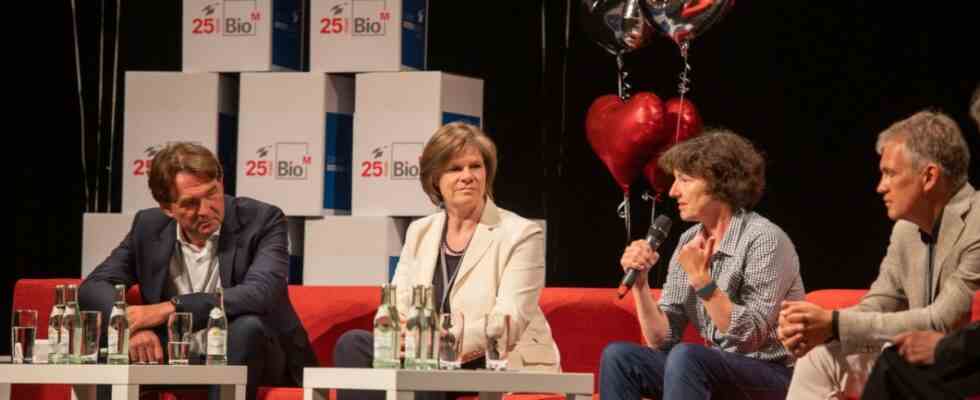All under one roof: the meeting of around 300 scientists, politicians and investors on the occasion of the founding of Bio M AG and the Munich biotech cluster 25 years ago was almost symbolic. In the Planegger Kupferhaus, the highly committed network organization of the biotechnology industry in Munich and Bavaria, based on the campus in Martinsried, was illuminated from all sides and also celebrated – rightly so, if you look at the figures and scientific successes that Viola Bronsema, the managing director of Bio Deutschland, presented in this context: The number of employees has skyrocketed from 2,500 then to 20,000 today in 220 biotech companies, twelve highly effective drugs have been developed, five billion euros have been invested in capital, and an additional two billion euros in infrastructure. “A rise to the premier class of biotechnology in Europe,” is how Bronsema sees it.
In the first round of financing there was one million marks
Bio-M managing director Horst Domdey, the man from the start, must have been happy. With charm and humor he led the international guests through the evening together with Bronsema. Sitting relaxed on the sofa, four rounds of talks were presented. In the first entitled “The Beginning” he spoke to the men of the first hour, the then Economics Minister Otto Wiesheu (CSU), Morphosys founder Simon Morony and the two first company founders Erwin Soutschek and Peter Heinrich. They were called “The Root” and even then a pandemic played a major role in the foundation: the immune deficiency disease HIV, which was still incurable 25 years ago. Heinrich said that they were additionally motivated. And Simon Morony, the grand seigneur of the German organic industry from New Zealand, mentioned the first round of financing amounting to one million marks – petty things compared to today’s orders of magnitude of millions of euros as a rule.
Former Economics Minister Otto Wiesheu and State Secretary for Economic Affairs Roland Weigert (from left) represented politicians.
(Photo: Catherine Hess)
In the second round of the Munich science scene, it was mainly two women who were in charge: Ulrike Protzer, holder of the Chair of Virology and the Technical University of Munich and laypersons, mainly known for clever statements about Corona from television shows, plus those with prizes overwhelmed Petra Schwille, Director of the Max Planck Institute for Biochemistry. Protzer praised the “extreme biotech scene” in Munich, which was “a huge plus” for research. Schwille, on the other hand, looked to the future and saw “a whole new campus” approaching science, which she underpinned, among other things, with the founding and renaming of the Max Planck Institute (MPI) for Neurobiology as the MPI for Biological Intelligence. “Other paths in research” she sees, the necessary “entrepreneurial spirit and extremely good people” are sufficiently available.
“You with your biotechnology”: Professor Stefan Engelhardt and Mayor Hermann Nafziger (from left).
(Photo: Catherine Hess)
The third round, entitled “Investors and companies”, primarily presented examples of the people who provide the necessary money for research if the state does not provide it sufficiently: “The future rests on your shoulders,” said Domdey before he left Conversation block “Outlook” came. Here, too, it was all about money. Planegg’s Mayor Hermann Nafziger (CSU), according to his own assessment “technically versed” and therefore “always interested in biotech”, sees a change in tax policy for the community. In contrast to the past, when, according to Nafziger, it was always “oh, you with your biotechnology”, the industry is “today a pillar for trade tax revenue”.
The mayor called on politicians to “take more care of infrastructure, housing and energy” – an approach that State Secretary for Economic Affairs Roland Weigert (free voters) was happy to accept. Ernst-Ludwig Winnacker, father and pioneer of Bavarian biotechnology, explained in a video message that he saw “a promising future for the Munich biotech cluster.”

